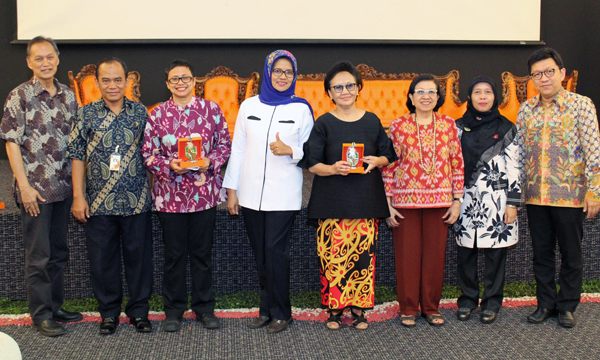Indonesia launch the STRiDE project
Indonesia launch the STRiDE project
19 Apr 2018
Indonesia
As a part of the national launch, our partners in Indonesia – Alzheimer’s Indonesia and Atma Jaya Catholic University of Indonesia – held a mini-seminar Strengthening Dementia National Plan: a Multi-profession dialogue at the Atma Jaya Faculty of Medicine. Four researchers and public policy practitioners from various disciplines presented and discussed dementia in Indonesia.
Neurologist Dr Yuda Turana discussed challenges in implementing Indonesia’s Dementia National Plan, noting that a major challenge faced is cross-programme and cross-sector coordination. He went on to say that the failure to reduce risk factors of vascular disease and the trend towards the ageing population contribute to the high incidence of dementia.
A member of Alzheimer’s Indonesia’s Advisory Board said “The STRiDE project aims to address these challenges. This research project, which runs for four years until 2021, will support the implementation of our Dementia National Plan and the development of various national policy to respond the increase of elderly population and number of people living with dementia in Indonesia”.
The Director of Centre of Ageing Studies, University of Indonesia and Rector of Respati University, Professor Tri Budi W Rahardjo said that successful ageing starts by reducing the risks of diseases earlier which interfere with the functional ability of an older person, such as dementia. “The needs of a person with dementia differ from one to another. When the needs of a person with dementia can no longer be fulfilled at home, long-term care might offer solutions,” Professor Rahardjo said. She also added that the readiness of diagnostic services and improvement in the quality of long-term care services are needed to improve the quality of life of a person living with dementia. High quality long-term care requires supportive environment and community.
A researcher from Indonesia’s Research on Ageing (InResAGE) Trisakti University, Dr Nugroho Abikusno, conveyed that Indonesia is facing a demographic bonus in which the size of the productive age population in Indonesia is at its peak and able to support the retired older population. According to Dr Abikusno, who was in Indonesia’s National Commission on Older People from 2004–2016, this is the right moment to develop age-friendly infrastructure and human resources – which also means elderly-and-dementia inclusive, focusing in the home environment and community. “The major challenges in achieving an elderly-and-dementia-inclusive Indonesia is the need for a quick and precise response from the government to implement the right policy and programmes at the national and regional levels. We need to reinforce age-friendly communities to address their local problems related to age-friendly infrastructure and its human resources including caregivers for people with dementia and the frail elderly. Development of age-friendly social businesses will also support the growing needs in Indonesia,” Dr Abikusno stated.
Asia Pasific Regional Director of Alzheimer’s Disease International (ADI), DY Suharya, explained that findings from the STRiDE multi-national study will play a key role in strengthening advocacy, research, and capacity building, as well as encouraging governments’ participation in reducing risk of dementia in Asia Pacific. “This study aims to help people with dementia and their caregiver to have a good quality of life and to receive the care and support that they need to fulfil their potential with dignity, respect, autonomy and equality,” she said.
The seminar attracted quite a bit of interest and the talks led to very interactive discussion sessions with lots of interesting comments. It was also covered by national press.
